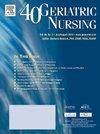低收入老年住房社区老年人主观记忆抱怨与认知表现:种族的调节作用
IF 2.5
3区 医学
Q3 GERIATRICS & GERONTOLOGY
引用次数: 0
摘要
本研究的目的是检验主观记忆抱怨和客观认知表现之间的关系,并测试在控制了年龄、性别和教育之后,这种关系是否受到种族的调节。这是一项描述性横断面研究,包括151名生活在低收入老年人住房中的老年人。逻辑回归模型的结果显示,与没有主观记忆投诉的老年人相比,在控制了年龄、性别和教育程度后,有主观记忆投诉的老年人认知受损的几率是没有主观记忆投诉的老年人的2倍(OR: 2.27, 95% CI: 1.08-4.78, p= 0.03)。种族缓和了主观记忆抱怨和认知受损几率之间的关系(p= 0.002)。研究结果表明,主观记忆抱怨与客观认知表现有关,这种关系在黑人和白人老年人中有显著差异。需要进一步的研究来了解这些种族差异的原因,并制定临床干预措施,以支持生活在老年住房中的老年人的认知健康。本文章由计算机程序翻译,如有差异,请以英文原文为准。
Subjective memory complaints and cognitive performance among older adults living in low-income senior housing communities: The moderating role of race
The purpose of this study was to examine the relationship between subjective memory complaints and objective cognitive performance and test whether this relationship was moderated by race, after controlling for age, gender, and education. This was a descriptive, cross-sectional study including 151 older adults living in low-income senior housing. Results from the logistic regression models showed that compared to those without subjective memory complaints, older adults with subjective memory complaints had 2 times greater odds of having impaired cognition, after controlling for age, gender, and education (OR: 2.27, 95% CI: 1.08-4.78, p=.03). Race moderated the relationship between subjective memory complaints and the odds of having impaired cognition (p=.002). Findings suggest that subjective memory complaints are associated with objective cognitive performance and this relationship differed significantly for Black and White older adults. Further research is needed to understand reasons for these racial differences and to develop clinical interventions for supporting the cognitive health of older adults living in senior housing.
求助全文
通过发布文献求助,成功后即可免费获取论文全文。
去求助
来源期刊

Geriatric Nursing
医学-护理
CiteScore
3.80
自引率
7.40%
发文量
257
审稿时长
>12 weeks
期刊介绍:
Geriatric Nursing is a comprehensive source for clinical information and management advice relating to the care of older adults. The journal''s peer-reviewed articles report the latest developments in the management of acute and chronic disorders and provide practical advice on care of older adults across the long term continuum. Geriatric Nursing addresses current issues related to drugs, advance directives, staff development and management, legal issues, client and caregiver education, infection control, and other topics. The journal is written specifically for nurses and nurse practitioners who work with older adults in any care setting.
 求助内容:
求助内容: 应助结果提醒方式:
应助结果提醒方式:


